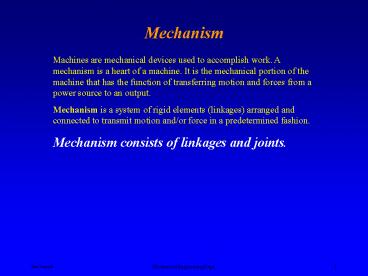Mechanism - PowerPoint PPT Presentation
1 / 50
Title:
Mechanism
Description:
Mechanism Machines are mechanical devices used to accomplish work. A mechanism is a heart of a machine. It is the mechanical portion of the machine that has the ... – PowerPoint PPT presentation
Number of Views:175
Avg rating:3.0/5.0
Title: Mechanism
1
Mechanism
Machines are mechanical devices used to
accomplish work. A mechanism is a heart of a
machine. It is the mechanical portion of the
machine that has the function of transferring
motion and forces from a power source to an
output. Mechanism is a system of rigid elements
(linkages) arranged and connected to transmit
motion and/or force in a predetermined
fashion. Mechanism consists of linkages and
joints.
2
Example of Mechanism
3
Example of Mechanisms
4
Example of Mechanisms
5
Example of Mechanisms
Stair climbing mechanism
6
Example of Mechanisms
7
Example of Mechanisms
8
Example of Mechanisms
Extension position
Flexed position
Six-bar linkage prosthetic knee mechanism
9
Four-Bar Linkage
10
Four-Bar Linkage Categories
Case I shortest link longest link lt
summation of the other two links
s l lt p q
11
Four-Bar Linkage Categories
Case I shortest link longest link lt
summation of the other two links
12
Four-Bar Linkage Categories
Case I shortest link longest link lt
summation of the other two links
- The longest link is fixed and either one of the
intermediate links is the driver. The result is a
double-rocker mechanism. Both, input and output
links oscillate.
Grashof condition one link rotates 360
13
Four-Bar Linkage Categories
Case II shortest link longest link gt
summation of the other two links
There are four possible mechanisms depending on
which link is fixed. All mechanisms are
double-rockers.
14
4-Bar mechanisms
15
4-Bar mechanisms
S l gt p q
4 double rocker mechanisms
16
The Slider-Crank Mechanism
Input link, crank
Coupler link, connecting rod
Output link, piston (slider)
17
Slider-Crank Mechanism
Offset slider-crank mechanism
18
Slider-Crank Mechanism
The mechanism has a stroke B1B2 equal twice the
crank length r2. Locations B1 and B2 are called
the extreme positions (limiting) of the slider
In-line slider crank mechanism
19
The Slider-Crank Mechanism
20
Slider-Crank Mechanism - Inversion
21
Mechanism Categories
Function Generation Mechanisms A function
generator is a linkage in which the relative
motion between links connected to the ground is
of interest.
A four-bar hand actuated wheelchair brake
mechanism
22
Mechanism Categories
Function Generation Mechanisms
A four-bar drive linkage for a lawn sprinkler
23
Mechanism Categories
Function Generation Mechanisms
A four-bar function generation mechanism to
operate an artificial hand used for gripping.
24
Mechanism Categories
Motion Generation Mechanisms In motion
generation, the entire motion of the coupler link
is of interest (rigid body guidance).
New Rollerblade brake system
25
Mechanism Categories
Motion Generation Mechanisms
Four-bar automobile hood linkage design
26
Mechanism Categories
Path Generation Mechanisms In path generation, we
are concerned only with the path of a tracer
point and not with the motion (rotation) of the
coupler link.
Crane straight line motion
27
Mechanism Categories
Path Generation Mechanisms
A four-bar path generation mechanism as part of
an arm-actuated propulsion system for a wheelchair
28
Primary Joints
29
Higher Order Joints
30
Motion Generation Mechanisms
31
Motion Generation Mechanisms
32
Straight line Mechanisms
33
Straight line Mechanisms
34
Straight Line Mechanism
35
Straight Line Mechanism - Application
Straight line mechanism with dwell
36
Scotch Yoke Mechanism
Example car window
37
Geneva Mechanism
38
Linear Geneva Mechanism
39
Ratchet Mechanism
40
Straight Beam Walking Mechanism
41
(No Transcript)
42
Roller and Flat Follower Cams
43
Cylindrical Cam Mechanism
44
Gears Rack and Pinion
45
Gears
Worm Gear Sets
Bevel gears
Planetary Gear set
46
V-8 Engine
47
Type of Motion and Mechanisms
Most power sources that are readily available
today are either of the pure rotational motion
type, such as electric motor or hand crank, or of
the pure translational type, such as pneumatic or
hydraulic cylinder, or linear actuators.
48
Type of Motion and Mechanisms
49
Type of Motion and Mechanisms
Rotation to Translation
50
References
- Mechanism Design, Analysis and Synthesis by
Erdman and sander, fourth edition, Prentice-Hall,
2003, - Machines and Mechanisms by Uicker, Pennock and
Shigley, third edition, Oxford, 2002. - Machines and Mechanisms by Myszka, Prentice-Hall,
2003































